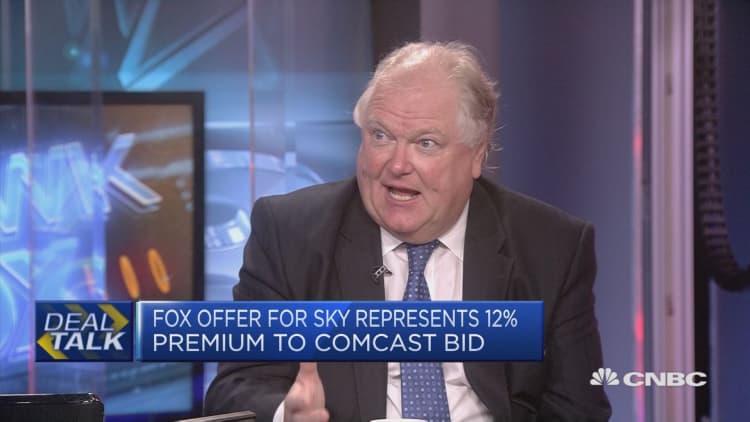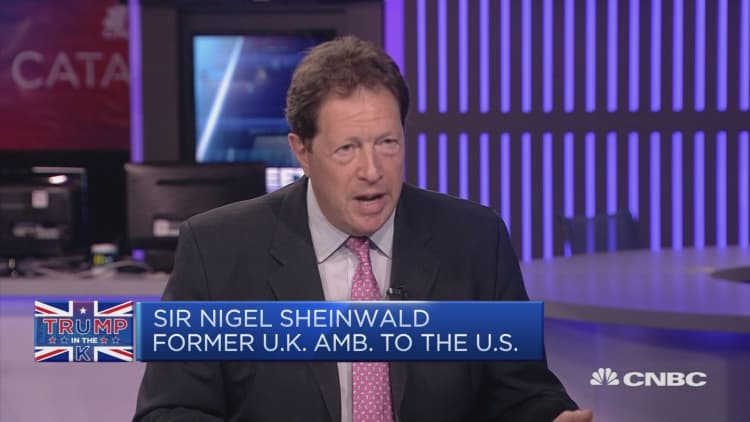The U.S. and U.K. have prided themselves on sharing a cultural, political and commercial bond that has long been called “the special relationship.”
But with President Donald Trump tearing up the status quo in terms of trade and diplomacy, does that bond still exist?
“I think the relationship between Britain and America has always been very important. For a hundred years, it really has been special. But I personally, as ambassador, didn’t use the term ‘the special relationship’ because lots of other people have special relationships with America,” Peter Westmacott, former U.K. ambassador to the U.S., told CNBC on Tuesday.
“But if you look at defense and intelligence and investment, trade and business, culture and movies and television, and a commonality of interests and values, then Britain and America have been hugely important for each other for a long time.”
The term “special relationship” was first used in 1946 by then-prime minister Winston Churchill, with the U.S. and U.K. having overcome the global turmoil, terror and loss of life of World War II together.
The relationship has since then been marked by ongoing commercial and cultural links, helped no doubt by a shared language, as well as shared military operations, the fight against the Islamic State militant group in Syria and Iraq being the most recent joint action.
But with Trump in the White House, the rules of diplomacy have been ripped up and the dynamic between the U.S. and the U.K., and the rest of the world, is changing. Whether the “special relationship” can survive such changes is hard to tell.
Troubled times
While the U.S. and the U.K. might have a lot in common, Trump’s inauguration as president heralded a new uncertain era for the “special relationship,” although the British government was quick to congratulate Trump on his victory and pledged to work with him.
Prime Minister Theresa May alluded to the relationship, saying she hoped the two countries would "strong and close partners on trade, security and defense.”
But Trump has since ruffled the feathers of both British politicians and the general public with a range of controversial comments on women, immigrants, Mexicans and Muslims. Indeed, his controversial remarks and policies have made it awkward for the U.K. to even host the former businessman this week.
In fact, such was the opposition to Trump’s upcoming three-day visit, from Thursday evening until Sunday, that an initial invitation to the U.K. for a state visit — where the head of state Queen Elizabeth II would host the president in a visit full of pomp and pageantry — was downgraded to a “working visit” amid concerns over likely widespread protests.
As many as 1.8 million Britons signed a petition in 2017 protesting against the then-planned state visit. Despite the downgrade, U.K.-wide demonstrations against Trump are still planned, with an expected 50,000 people likely to gather in London on Friday for a “Stop Trump” protest.
The itinerary for the three-day visit appears to be designed to keep Trump as far away as possible from the capital to avoid any embarrassment by the protests.
Permission has been granted by London Mayor Sadiq Khan, , to allow a 20-foot-tall balloon depicting Trump as a baby to be flown over the capital. The campaigners who paid for the balloon have said it represents Trump’s character as an "angry baby with a fragile ego and tiny hands," but it has drawn criticism for being disrespectful.

Digby Jones, former director-general of the Confederation of British Industry (CBI), told CNBC on Wednesday he thought it was “disgusting” that the Trump baby balloon was being allowed.
“He’s our biggest trading partner, he’s democratically elected, he is our biggest inward investor and more Americans go to work every day working for a company headquartered in Britain than any other country on Earth. And on that basis, we should actually afford him the courtesy which he singularly fails to afford anyone on the planet and we should behave completely impeccably,” he told CNBC’s “Squawk Box Europe.”
“I think, personally, that it’s disgusting that they’re going to put up an inflatable baby up in a nappy. Would we like it if he put an inflatable Queen up over the White House with a nappy on? We’d hate it,” Jones said, although he accepted the right to protest as “a pillar of a free society.”
“I’m not going to say we should ban it, I just think we are behaving wrongly if we lower ourselves to the sort of level he swings every day… the point is the American people elected this man and we should be dealing with him.”
Policy differences
Positive vibes or none, there remains a number of key policy differences at a U.S.-U.K. governmental level.
“There is a strong relationship between the U.K. and U.S., it’s historically strong, it’s strong in trade, in economic relations, in defense, intelligence and strong in people to people exchanges, “ Nigel Sheinwald, a former U.K. Ambassador to the U.S. told CNBC Wednesday.
“But President Trump has introduced policies which are not the policies of the British government or many other governments in the world, certainly not in Europe – on the Middle East, climate change and on trade.”

The U.K. opposes Trump’s trade tariffs, has argued against his withdrawal from the Iranian nuclear pact, and has made commitments to tackle climate change. Trump, on the other hand, has disrupted agreements on all those issues. Even Brexit, over which May’s government is more divided than ever, Trump is a supporter of the U.K. leaving the European Union.
Whether the U.K. could strike an advantageous trade deal with Trump, whose political mantra is to put “America First,” is far from certain.
“Right now, I think amongst the peoples of the two countries, when you look at the polling on this, it’s still very strong — people still have an affection and respect for America as leader of the free world,” former ambassador Westmacott said.
“But, at the government level, the facts are pretty clear that on a number of issues that are important for Britain and where we’ve traditionally seen eye-to-eye with the Americans — like climate change and free trade, like the Middle East and Arab-Israeli issues, like the Iran nuclear deal… the EU and NATO. Those are all areas where President Trump has up-ended the normal way of seeing things and the normal ways Britain and America have seen eye-to-eye.
“So, on those things we’re not in the same place and I very much hope we’ll get back to it.”
Trade woes
Trump’s position on trade has recently rattled his relationship with Downing Street — let alone with China, Mexico and Canada — with the U.K. as an EU member, for now, unsuccessfully seeking an exemption to tariffs on steel and aluminum.
The British government has called the decision to press forward with tariffs as “unjustifiable” and said that “any claim that U.K. steel and aluminum imports harm U.S. national security is without foundation.”
Trump has widely criticized the U.S.’ biggest trading partners and allies, saying that they have taken advantage of the U.S. and built up trade surpluses. Trump has announced this year sweeping tariffs on a range of imported goods – mostly from China – but has also threatened neighbors and allies Canada, Mexico and the EU.
Digby Jones said the entire trade row at the moment was characterized by Trump “pushing it out as far as he can go, he’ll give himself some room for manoeuver and then he’s going to come back.”
But he added it was a “mistake” for the U.S. to alienate its friends and allies, particularly Britain, which has always fought alongside the U.S.
“What I would just say to him is, ‘Everybody in life Donald, and especially in international diplomacy, and especially when you’re America, needs friends. You don’t always need them all the time but you need your friends.
“And beating up on Britain is possibly a silly thing to do because history shows that, with the exception of Harold Wilson and the Vietnam War, Britain has sent its blood and treasure alongside Americans on every single occasion that it’s being called on to do so.”


